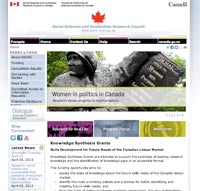WATERLOO – Wilfrid Laurier University is launching a world-class research centre linking two of the most pressing issues of our time — sustainability and food.
The Laurier Centre for Sustainable Food Systems (CSFS) will be led by Alison Blay-Palmer, a widely-published associate professor of Geography and Environmental Studies at Laurier and leader of the Nourishing Ontario research and community outreach project. Blay-Palmer brings her international connections with leading authorities to the centre, many of whom will be sitting on the advisory committee.
“We are very excited about the creation of the Centre for Sustainable Food Systems,” said Blay-Palmer. “Local and sustainable community food initiatives reflect growing public awareness that food can act as a vehicle for positive change. We plan to be at the forefront of research on these initiatives.”
“The Centre for Sustainable Food Systems will open more opportunities for cross-disciplinary collaboration in an area that is critical to society as a whole,” said Abby Goodrum, vice-president: research. “The vitality of our newest centre is representative of the thriving research climate at Laurier.”
Jonathan Crush, CIGI Chair in Global Migration and Development at the Balsillie School of International Affairs and leader of the Hungry Cities Initiative, will be the associate director of the new centre. Crush is also the founder and lead researcher of the African Food Security Urban Network, focusing on urbanization, food security and migration. He has a lifetime external funding record of more than $18 million.
“The new centre is very timely and has the potential to contribute greatly to addressing the research and policy challenge of urban and rural food insecurity in Africa and elsewhere,” said Crush. “New and innovative solutions to the problems of over and undernutrition are urgently required and the Centre for Sustainable Food Systems will be in the vanguard of applied research and policy-making with partners across the Global South.”
A core of Canadian and international researchers involved with Nourishing Ontario will continue their collaboration through the CSFS. In addition, the centre will involve the more than 20 Laurier faculty with expertise in a range of food research areas.
“This centre will put Laurier and Kitchener-Waterloo on the map on the issue of sustainability and food,” said Blay-Palmer. “We’re looking forward to bringing in internationally recognized speakers, attracting top graduate students and faculty as visiting scholars, and engaging the entire university and regional community.”
A grand opening for the centre is planned for this fall.
Contact:
Dr. Alison Blay-Palmer, Associate Professor
Geography and Environmental Studies
519-829-0059 or
Kevin Crowley, Director, Communications & Public Affairs
Wilfrid Laurier University
519-884-0710 ext. 3070 or kcrowley@wlu.ca




